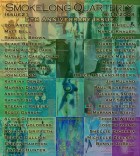From where did the idea for “Toes” originate? How did that idea develop into this remarkable story?
I’m pretty sure I was free associating. Most of my stories start that way and I think this one finished that way too. I rarely ever think these days, ‘I have an idea for a story, now I will go write it.’ It’s more like, ‘I’m going to write a bunch of nonsense and then see if there’s anything interesting in it.’ This one took a while, I will say that. I wrote the original thing many months ago, then whittled it, then submitted it, then while it was in slush piles I started to get the feeling I needed to tighten it more, like it was really bothering me so I withdrew it from everywhere and hacked it to its bones and now it’s its bones and I sent it to Smokelong and here it is and now the world’s turnin.
I love the idea of “cellmates” in this story. Toes remind me of cellmates, trapped as they are in socks. How do you read that sense of cellmates in “Toes”—and do you have a cellmate in your own world, Darby?
That’s an interesting connection. I don’t think I ever consciously thought of that until you mention it now but it’s certainly a connection. This happens to me all the time, like other people make connections in stories I’ve written that I never see until they say it. Then when I see it it becomes perfectly obvious, like I have to admit, yes that connection is there and I have no idea how that happened. I don’t have a cellmate (unless you mean soulmate, which I do (that’s corny and makes me laugh).
I found myself singing part of this piece: “In the park, my toes greet the toes that peek from your trendy shoes….” I think it has a nice beat and you could dance to it. How conscious are you of the sound of a piece—and what are some ways you get that sound sense into your writing?
Thank you. I like that line a lot too. I’m very conscious of sound lately, trying to play with meter and alliteration and even rhyme in a way that isn’t too mother goose. My toes greet the toes that peek, I love that. I’m probably paying more attention to the way the whole thing sounds much more than I’m paying attention to what the story means or if it has a theme or something. I just want things to sound good these days.
There’s a “you” that appears in this story. I get the sense that this “second person” isn’t me, reading the story. It’s a different you. What do you know about this “you”?
You are the girl sitting outside of prison. I have no idea what made me refer to her as you. I’m not even sure it works. Why did I refer to her as you? Probably left over from free associating and I never saw a reason for her to not be you. I hope it is okay that you are her.
Tell us all you can, Darby, about ABJECTIVE.
Thanks for mentioning ABJECTIVE! It is a new thing I am the editor of. Publishing one story/poem/text every Saturday. For awhile I’ve thought about starting something of my own and how I would do it and something made me finally do it, so it is it now. I don’t want to say anything specifically about what kind of aesthetic I’m trying to publish because I think any definition is in a sense a limitation and I’m all about openness. Submission policy: don’t worry if you don’t think it fits, just send it and let me make that decision, it won’t cost you much because I’ll reply within a couple days.
Also, something that’s happening with it that I never planned on has to do with the sense of formality in the layout. It’s very simple but it’s also very rigid I think. The margins, because that’s all that’s there, become very important. But what’s happening is I seem to be inviting or wanting people to rebel against that formality, to challenge it, and I am very accommodating. I’m pretty sure I can code in html anything anyone wants. Jeff Crouch’s ‘drifter’ is I think a really great example of a piece of writing literally extending beyond the ABJECTIVE template. Because I hand code everything in html myself, and because the code itself is deliberately as simple as possible, I have a lot of control to do things like this. In the future, I hope to further explore this duality between formality and rebelling against formality.



 The SmokeLong Grand Micro Contest (The Mikey) is now an annual competition celebrating and compensating the best micro fiction and nonfiction online.
The SmokeLong Grand Micro Contest (The Mikey) is now an annual competition celebrating and compensating the best micro fiction and nonfiction online.